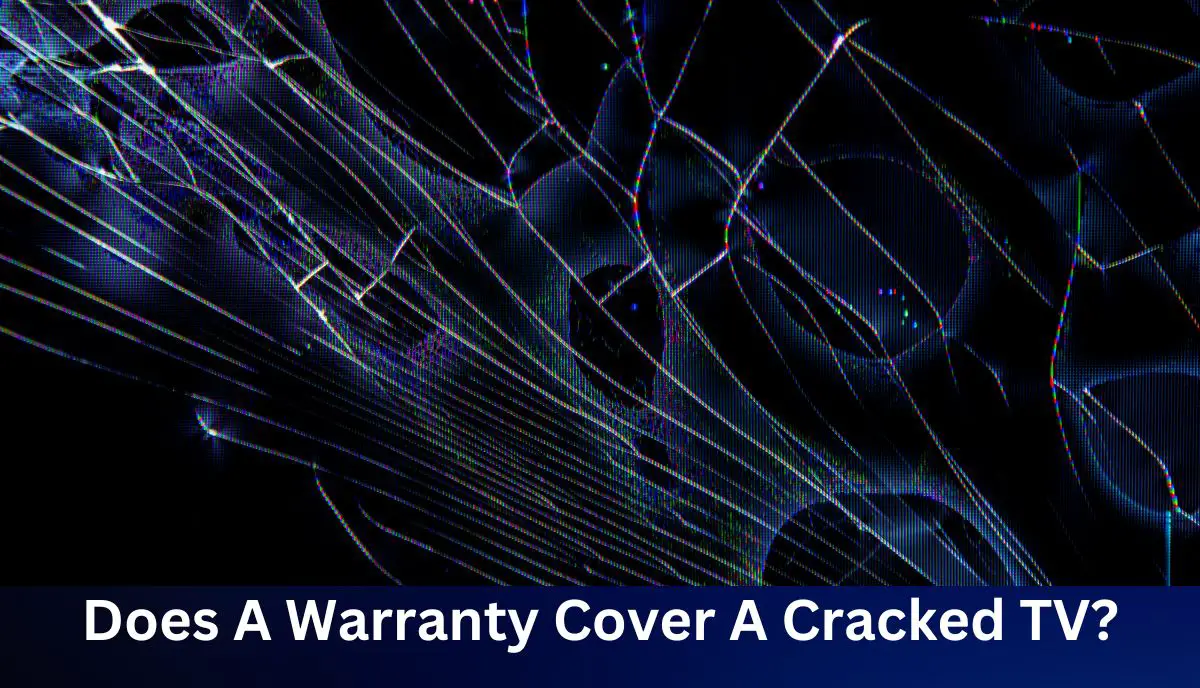| Does Samsung TV Warranty Cover Cracked Screen? | NO |
| Does Best Buy Warranty Cover Cracked TV Screen? | NO |
| Does Costco Warranty Cover Cracked TV Screen? | NO |
| Does Walmart Extended Warranty Cover Cracked TV Screens? | No |
A warranty does not cover a cracked TV screen. Warranties don’t cover accidental damage, which is where cracked screens usually fall. However, firms like Walmart offer special insurance and protection plans that provide coverage for screens that crack due to accidents. While a basic warranty is free, you must pay for the protection plan.
This doesn’t make sense to laypeople because they expect a warranty to provide cheap repairs for any damage their device sustains. But that isn’t necessarily true. This is everything you need to know about warranties:
- Investopedia traces product warranties in the United States to 1975, when Congress passed an Act that attempted to protect consumers from fraud by detailing the standards and rules manufacturers must follow when crafting warranties.
- The law expects corporations to disclose the details of each product’s warranty. They also include hefty penalties for companies that make false claims or use misleading terms.
- Cornell Law School has highlighted the importance of the ‘Implied Warranty Of Merchantability.’ It applies to every item sold by a person who deals in those particular goods, regardless of whether or not their offer includes a formal warranty contract. Under the terms of the implied warranty of merchantability, the seller promises that the product they sold to you is fit for its intended purpose.
- As a consumer, the warranty entitles you to compensation if the product does not perform as promised. That includes the implied warranty.
- The warranty a manufacturer explicitly provides is called an ‘Express Warranty.’ This is where the company promises to repair or replace a product that fails to perform according to the promised specifications. While some express warranties are verbal, consumers are encouraged to secure written contracts.
- Warranties apply to products that are still in the condition they were purchased. You void the warranty when you alter the product.
- Manufacturers won’t necessarily take your word at face value when you claim that a product failed in its performance. They will ask for proof.
From those descriptions, you have probably noticed a vital aspect of warranties. They kick in when a product, such as a TV, fails to perform as intended. If the TV has failed to perform its function, the manufacturer is at fault. They sold you a defective item.
As such, they are obligated to compensate you. But cracks in TV screens are different because they typically appear when you mishandle the TV. A manufacturer cannot fix a problem you caused for free. They are only responsible for the problems they cause. They can still fix a problem you caused if you pay a fee.
What Does A Warranty Cover?

You can’t take advantage of a warranty’s benefits if you don’t know what it offers. Admittedly, the terms and conditions will vary with each manufacturer. But most of them provide protections for the following:
- Hardware Faults
This is the primary objective of a warranty, as far as most laypeople are concerned. A warranty kicks in whenever a TV arrives at your doorstep with a physical defect. For instance, you can get a replacement TV if the screen was cracked when you took it out of the box.
You can’t apply the warranty when your child accidentally tips the TV over. But how can a manufacturer tell that a TV was broken from the start? How do they know it was a factory error and not your fault?
This is where complications arise. The manufacturer can ask for proof that their actions caused the fault. But most people cannot provide that proof. You can’t assess a TV’s state without taking it out of the box.
And for all the manufacturer knows, you dropped the TV while removing it from the box, cracking the screen in the process.
It becomes a gamble for them. As such, they usually cover the cost of repairs for faults you report shortly after buying and receiving the TV. The longer you wait, the less likely they are to believe you.
- Software Glitches
Software errors won’t crack the screen. However, they can lower the brightness, generate horizontal lines, distort the image, turn the screen off, and more. But again, the manufacturer needs proof that a software glitch is a factory error and not the result of your actions.
Fortunately, they have technicians on hand who can scrutinize the software glitch to get a better sense of its origins.
How Can I File A Warranty Claim For A Cracked TV Screen, and What Documentation Might Be Required?
- Read the terms and conditions. Is the warranty still active, or did it expire? Does the cracked screen meet the terms detailed in the contract?
- If you have evidence of any sort, collect it. That includes photos of the product before and after it cracked and proof of purchase. Some people will record themselves opening the box to show that the screen was broken when the TV arrived.
- Submit your documentation to the manufacturer via email or their website. You should contact them beforehand to get a better sense of what they want from you.
- Once you submit your documents, wait for the company to review your claim and provide a response. This could take hours, days, weeks, or more.
- If the manufacturer accepts your claim, they will tell you what to do next. For instance, they may direct you to the nearest repair center or ask you to mail the broken TV back to them.
Some people prefer to visit the brand’s local retailers. If you have a purchase invoice and a copy of the warranty policy, the local retailer will help you.
Are There Specific Warranty Conditions Or Fine Print Related To Screen Damage That I Should Be Aware Of?
- Manufacturers won’t approve claims for altered products. The law expects the product to work as the manufacturer promised. The manufacturer is not liable for malfunctions if you modify their TV.
- The manufacturer won’t honor the warranty if they have reason to believe that you placed the TV in environments with risky conditions.
- The manufacturer can void your warranty if you attempt to fix the TV yourself. This doesn’t apply to every company. Some brands are flexible. However, they will definitely void your warranty if you allow a third-party technician to tamper with the TV.
- The manufacturer won’t honor the warranty if their product incurs damage because you used it for a purpose for which it was never intended.
- Some manufacturers provide an additional warranty that covers damage caused by you. Consumers can also buy warranties that cover cracked TV screens from third parties. Your home warranty may even cover the broken screen.
- Some manufacturers won’t fix a cracked screen for free, but they offer repairs at discounted prices.
- You can file a complaint with the Federal Trade Commission if you think a manufacturer is wrong in refusing to honor their warranty.
If The TV Screen Is Cracked During Shipping Or Delivery, Is it Covered Under A Different Warranty Or By The Seller?

This Samsung guide states that their warranty doesn’t cover the risks associated with the transportation of their product from the service center to your home. If you drove the TV from the Samsung store to your home, you are responsible for any damage incurred during transit.
If a Samsung retailer delivers the TV to your home, they must pay for any cracked screens you notice when you remove the TV from the box. If you or the retailer hire a third party to handle the delivery, that third-party company is liable for the damage.
The entity delivering the product is liable for its safety. Don’t expect the warranty to cover damage that occurs during transit. That said, it doesn’t hurt to check.
Contact the manufacturer and ask whether their warranty covers transport-related damage. If it doesn’t, make sure the entity delivering the TV provides this coverage.
What Types Of Damage Are Typically Excluded From TV Warranties?
- Water damage is not the manufacturer’s fault. Therefore, their warranty won’t cover it. If the water damage occurs during transit, the entity making the delivery is responsible. They will compensate you. Otherwise, every TV manual tells consumers to keep the TV away from water. Therefore, you have no excuse.
- Manufacturers are equally disinterested in TV thefts. Once again, the only exception is thefts that occur before the TV gets to your home. In that case, you can talk to the entity responsible for the delivery about getting you a replacement.
- Natural wear and tear doesn’t concern the manufacturer. Your warranty will expire long before old age kills the TV. However, in the event that the warranty outlives the TV, the manufacturer won’t compensate you, especially if your actions are responsible for the accelerated wear and tear.
- The manufacturer won’t compensate you if an accessory they did not approve damages their product. The fault for such problems lies squarely on your shoulders.
- Don’t expect compensation if faults arise because of improper installation. The manufacturer expects you to follow their instructions.
- Acts of God, such as fires and lightning strikes, are not covered by the warranty because they are beyond the manufacturer’s control.
- The warranty doesn’t cover virus and malware infections.

